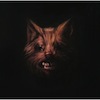Swans, "The Seer"
 Much ado has been made about its two hour duration, and Michael Gira's assertion that The Seer represents the culmination of the entire Swans discography, which is not to be disregarded. From the monolithic, visceral guitar stabs, to the dark, folk hued melodies, and dissonant, deconstructed samples and loops, it all appears here, sometimes within the same song. Thankfully, it does not come across as a conclusion, but the culmination and self-actualization of a long, unparalleled career.
Much ado has been made about its two hour duration, and Michael Gira's assertion that The Seer represents the culmination of the entire Swans discography, which is not to be disregarded. From the monolithic, visceral guitar stabs, to the dark, folk hued melodies, and dissonant, deconstructed samples and loops, it all appears here, sometimes within the same song. Thankfully, it does not come across as a conclusion, but the culmination and self-actualization of a long, unparalleled career.
In some ways My Father Will Guide Me Up A Rope To The Sky felt incomplete as a Swans album in that pieces of it ("Jim," "Reeling the Liars In") sounded more like Gira's work with Angels of Light than the explosive, grandiose drama associated with every step of Swans' career.This was exacerbated to me upon seeing them on their 2010 tour, where the more Swans-like tracks from that album took on an even stronger, more fully realized form in the live setting.While no recorded medium can fully replicate the physical impact of a Swans concert, The Seer comes closer to that intensity than most studio albums could.
The centerpiece of the album, the 30+ minute title track, brilliantly spreads all over the place.Opening with a sustained mass of horns and strings that resemble some of Hermann Nitsch's best compositions, it eventually retreats into a slow build guitar/bass/drums arrangement.It unsurprisingly comes to a dramatic head:a pounding, abusive roar of drums and guitar that has all the aggression of something from Cop, though with full on violence rather than seething rage.It does ascend from music into something different: a living, breathing monstrosity of sound that no other band could build.However, while this song could be the embodiment of Gira's 30-year career, it is not afraid to throw in some curve balls.The uncharacteristic vocal delivery at the end bears more than a passing resemblance to Damo Suzuki, atop an Eastern affected instrumental backing, something I would have never expected to hear.
Closer "The Apostate" is the other monolithic pillar of The Seer.Clocking in at just over 23 minutes, it also does an admirable job at condensing the Swans legacy into a single piece.Expansive, opening textures and ambient loops give way to a glorious wall of guitar noise and massive drums, forming into the pounding riffs and guitars, and ending with Gira literally singing in tongues.With this, the album and song culminates with that sense of religious ecstasy that Gira has been working with since Children of God.While it has been hinted at on previous albums, here it is fully realized.
Divisive former Swans member Jarboe even appears, in the form of vocal fragments on "A Piece of the Sky."Throughout its 20 minutes, it is a backwards journey through the Swans discography.Initially resembling Soundtracks for the Blind via its dissected loops and heavily processed recordings that are almost completely unidentifiable, it all transitions into a melodic bombast akin to Love of Life, with its slower pace and rich orchestrations, with vocals appearing only within its dying moments.
The smaller pieces here could potentially get lost within the sprawling epics, but for the most part they stand on their own, even in their shorter durations."Lunacy" has the unfortunate slot opening for such a dramatic album, but does so very well, embracing that barely contained mass of sound that is Swans which inevitably explodes.It is a bludgeoning introduction, even with the folky vocals from Gira and guests Alan Sparhawk and Mimi Parker from Low.
The early form of "The Seer" that appeared on the limited first run of We Rose From Our Beds—that Gira said would be discarded—appears in a more fleshed out form as "The Seer Returns," which is not a reprise as much as it as stand alone piece, a vaguely bluesy number that moves along with a relatively high level of restraint.
"Song For A Warrior" is the only odd duck on this album.This is an acoustic ballad of sorts with Karen O of the Yeah Yeah Yeahs on vocals (Gira doing background).Perhaps it harkens back too much to the Angels of Light material, or it just has a different sense to it overall, but it just seems a bit out of place.Even after a number of plays, I’m still not entirely sure how I feel about it.
The Seer is one of the few albums that are not listened to as much as experienced.Like the body of Swans discography, it is not as much about catchy songs or memorable melodies, but a cathartic experience like no other.However, it is more than just a work of power and drama, but a piece of art that is best experienced again and again.Like all good art, it is not always pleasant or enjoyable in the traditional sense, but it a vital work nonetheless.
samples:
 




